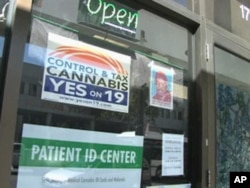California could become the first American state to allow people to smoke a joint just because they feel like it.
In 1996, California became the first U.S. state to approve the medical use of marijuana. Since then, 13 other states and Washington, D.C., have passed similar laws.
Now a measure on the California ballot in November, called Proposition 19, will determine whether to legalize small amounts of marijuana for recreational use, despite a federal law against it.
Proposition 19
Marijuana is widely available in California at special cooperatives and clinics. Anyone with a doctor's note who is registered as a marijuana patient can get the drug for nearly any ailment.
What California voters must now decide is whether to legalize and tax small amounts of marijuana for use by any adult - without a doctor's note. The measure was placed on the ballot through a petition drive.
"It decriminalizes possession [of small] amounts, while at the same time offers up the opportunity to control, tax and regulate on the other side," explains Dale Sky Jones, spokeswoman for the campaign in support of Proposition 19.
Thriving industry
In the city of Oakland, a thriving industry has grown around marijuana and other products of the hemp plant. The Oakland Patient ID Center is a privately-run enterprise which issues identity cards to its members and sells marijuana-related supplies.
"Basically, we provide anything that has to do with hemp-associated goods, anything made out of hemp," says Chad Gilmore, who manages the center. "We carry T-shirts and bags and products - body products and shampoos and such - that are all associated with hemp oils. But we also carry pipes and smoking supplies. A lot of vaporizers, vaporizers being another way to medicate in a concentrated for with hot air."
Oakland is also home to a training school called Oaksterdam University, named after Oakland and the marijuana-tolerant Dutch city of Amsterdam. Students learn to grow marijuana and run marijuana clinics. Spokeswoman Salwa Ibrahim says the school attracts students from around the world.
"They've had Iran, Japan, the Philippines, Guatemala, Costa Rica, Russia," she says. "We've had students from all over."
One of them is Jesus Hernandez, an 18-year-old from Alameda, California.
"I plan to get into the industry, make as much money as I can, take full advantage of this opportunity that I have," says Hernandez.
Money maker
Local officials at Oakland City Hall also hope to see the industry expand. City Council member Jean Quan says it can help the local economy and increase tax revenue.
"Either medical marijuana is going to be produced here on the West Coast or some day the tobacco industry, when it's legal, will probably produce in places like Virginia," says Quan. "But in the interim, there's a lot of interest, so we've decided to license four producers, and we've gotten over 100 applications. Some of the applications include partnerships with some pretty big drug companies and manufacturers."
While there is little opposition to marijuana in Oakland, polls show that California voters are divided on Proposition 19. Former Oakland police officer Pete Dunbar is now police chief in the city of Pleasant Hill.
"Oakland sees this as being some way to help with their budget deficit because they've got the dispensaries already there in place and all it will take is a little bit of tweaking, regulation, and they could be up and running, which is a sad way to deal with your deficit by selling marijuana."
Details of existing law are still being debated and the new ballot measure would add more uncertainty.
Some critics say clinics skirt existing California law by selling marijuana. They argue the law requires marijuana patients to raise the plant themselves or in collectives, and not sell it.
Industrial-scale plots, like those planned in the city of Oakland, will probably bring court challenges. Many in the law enforcement community have asked federal authorities to contest the measure, if it does pass.












